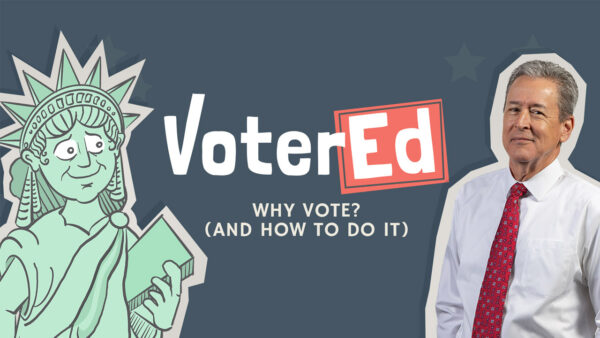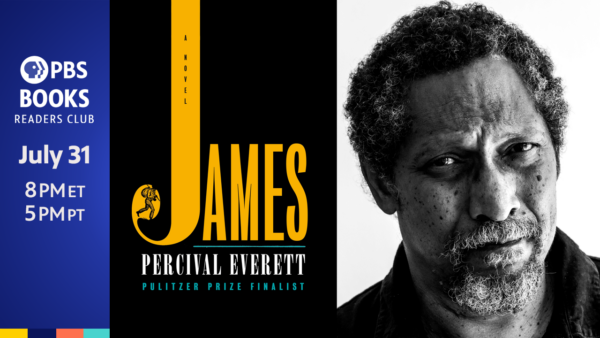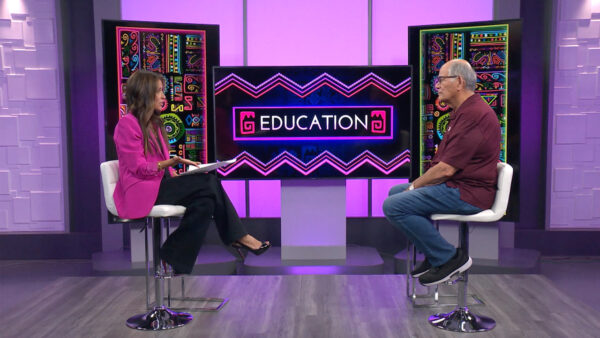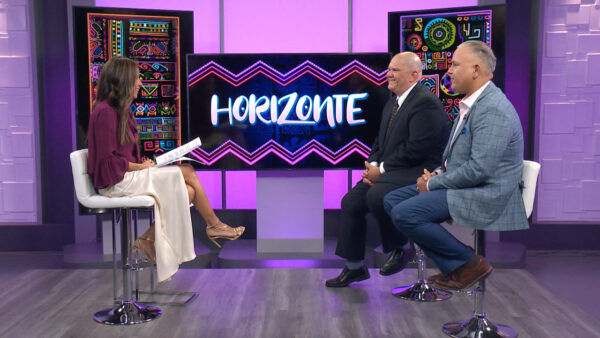The Arizona Ethnic Studies Network was created by educators across the state. Karen Leong, Associate Professor at the ASU School of Social Transformation and member of the Arizona Ethnic Network, and member James Garcia, talk about the group and the decision by the Tucson Unified School District to remove particular books that have been taught in Mexican-American Studies classes.
José Cardenas: The Arizona Ethnic Studies Network was created by educators across the state. The group was at the state capitol yesterday to protest what they say by the decision by the Tucson unified school district to remove books that have been taught in Mexican-American classes. Karen Leong is a member of the Arizona Ethnic Studies Network and also associate professor at the ASU school of social transformation and James Garcia, also a member of the network. Thank you both for joining us on "Horizonte." James let's start with you just to get the background of the, quote-unquote, banning that led to the protest that Karen was involved in. Kind of an exchange of words. Karen, you wrote a response to an "Arizona Republic" editorial suggesting this was in many respects much ado about nothing. A tempest in a tea pot, referring to the allegation that The Tempest by Shakespeare was one of the books that was, quote-unquote, banned. What can you tell us?
James Garcia: Technically the editorial in the republic was in response to Karen's column. The point we were trying to make, organizations that, there's been an educational program in Tucson that has existed for many years that was essentially teaching students a broad array of historical and cultural information about the Mexican-American community, an important story, of course, thin country and particularly in this state, you will. And that program has been shut down. And there are series, a number of books that were being taught in that program that can literally no longer be taught. Frankly, many of those are books that I as an instructor at ASU, have used that Karen has used, books that we consider important to providing a context about the nation that we live in and our history. And when you with create the situation in which students in essence are forbidden from being taught the information in the context of that information in a classroom anymore you are de facto banning information. You are de facto censoring information.
José Cardenas: Is that your response to the fact that the school district makes and the republic seems to echo, we are only talking about seven books, they weren't banned. These were books used in the curriculum. They were in the classrooms. We had them taken off the classrooms because we are not offering the courses anymore. But the books themselves are still available for students in the library and other locations.
James Garcia: Well, I think that the point, first of all, is the fact a book is available in the library here at Arizona State University, we may have a million books in the Hayden library for all I know, the availability of a book on its face does not necessarily mean that these are, that these are books that are, you are able to use in a classroom to teach in a classroom, to put in context and so on and so forth. What has happened there is that you have essentially removed the mechanism by which trained educators are able to convey this information in context, and within sort of the context of our history in country and our culture. And by doing that you have de facto censored that information.
José Cardenas: Is it your information that if a person teaching literature in the Tucson unified school district wanted to use one of these books -- not the seven -- but the bigger list that you are talking about, that they would be prohibited from doing so?
James Garcia: I don't know. I don't know if specifically if that's become policy but I would certainly be stunned if one of the books, say, for instance, like "A different mirror," by Ronald Takaki were suddenly being taught by one of the teachers who has now been removed from the Mexican-American studies program and put into the social studies program. If that person said, you know what? I will continue teaching this book, and teaching this book. It would be amazing to me if the school district at this point, given the controversy, would allow the teacher to teach that book much less keep their job.
José Cardenas: Karen, it's the concern about this broader, quote-unquote, ban that led your organization to conduct the read-in. Before we talk about the read-in first tell me about the organization.
Karen Leong: The organization started in response to the potential dismantling or shutting down of the Mexican-American studies program by the Tucson unified school district. We fored, there was different regional groups concerned about this issue and we communicated and created the sort of statewide network where we could mobilize educators who understand the value of ethnic studies and these particular texts and the particular Mexican-American studies program because it has been very important for student retention and success. And it has reached not only Mexican-American students but students, any student can take this program. So we believe that we want to counter so much of the misinformation and distorted ideas about what ethnic studies constitutes that it's not about teaching hatred. It's not about overthrowing the U.S. government, as some of the, as we have heard some of the elected officials claim. It is actually about teaching people a more complete history of the United States, to understand why different people experienced different historical events in the United States differently.
José Cardenas: Now, if there were people doing what has been alleged, as you said, allegations are that people were teaching overthrow the United States. And also hatred of other ethnic groups. Would that be inappropriate?
Karen Leong: That would be very inappropriate.
José Cardenas: With or without an ethnic studies law.
Karen Leong: Whatever class, because people can teach that in any subject, in any field. Teachers can go off and we have no evidence that instructors and the teachers in Mexican-American studies were doing this. I have seen no evidence for this. But if there were students -- if there were professors or teachers in English, or in history that were doing that, or Mexican-American studies, yes, there should be an investigation. There needs to be some sort of process, though. Process by which to determine, is this really happening? Are the students just dissatisfied and trying to slander a teacher? And if that's the case, if it is actually true that a teacher is inappropriately imposing certain beliefs upon their students, not encouraging them to think broadly, to think expansively, not presenting alternative perspectives, to challenge them to go beyond what they think they know, then, yes, that's an issue. And we do not advocate that in ethnic studies.
José Cardenas: Let's talk quickly about the reading itself. You had a group of people reading portions of the books.
Karen Leong: Yes. The different books that have been taught in Mexican-American studies curriculum. So we had over 26 individuals, from different groups, the ACLU had different readers, Arizona teachers for justice, and also different educators, some grad students read passages from the books that were included on the seven that you talk about, and also that have been taught in the curriculum.
José Cardenas: And what's the ultimate goal of your organization? Is it to have the legislation repealed? The ethnic studies legislation repealed?
Karen Leong: We believe the legislation should be repealed. We are against 2281, and our ultimate goal in having excerpts read from these books was also that each reader, many of them shared how transformative it was to be exposed to these different perspectives, including European American students, including European American adults. They said this expanded their knowledge of their society. Other people talked about how they didn't even know their own history and how exciting it was to learn what it meant. To come from a different background and experience the whole of history.
José Cardenas: James, let me ask you this. Don't you, in the end, have to repeal the legislation? Because would you agree that technically, there may have been or probably were violations of the statute. As many people would say it's very vague. The judge didn't find anybody was promoting the overthrow of the United States. But the other provisions, such as promoting ethnic solidarity, creating a resentment against other ethnic groups.
James Garcia: First of all, I think on its face, the law, if challenged, is probably unconstitutional. But it's so vague. What is ethnic solidarity? Is me saying to my brother, we should be proud of our Mexican-American heritage? Is that ethnic solidarity? Or is that somehow really an acknowledgment of our Mexican-American heritage which includes by the way, our American heritage. The terminology applied is so vague. Let's not forget the judge did rule, the administrative judge did rule that somehow this program was in violation of the state law. But an independent audit that the school superintendent paid for ruled exactly the opposite and the school superintendent decided to ignore that. And say, well, I need to go in direction because it's going to sort of serve my purposes. I think there are two fundamental things that we should think about here. One of them is that the program, the purpose of ethnic studies teachings is about expanding broadly the knowledge base of students so that they understand the context of American history as a whole. And that includes the good and the bad. And then the other thing that I think we cannot forget is clearly there are political ideologies that have clashed here which have nothing to do with curriculum, which have nothing to do with a particular program being taught, that have infiltrated themselves into this whole process and really ultimately led to the demise of this program. The really interesting point, the Tucson unified school district has never stated, we are going to eliminate this statement because we agree with Mr. Huppenthal that this program was in violation of that law. What they said we are going to eliminate this program because we don't want to lose $15 million in funding. That's a very different thing than what Mr. Huppenthal was suggested.
José Cardenas: On that point, I am sorry but we are out of time. Thank you both so much for joining us on "Horizonte."
Karen Leong:ASU Associate Professor School of Social Transformation, Arizona Ethnic Network member; James Garcia:Arizona Ethnic Network member;




















